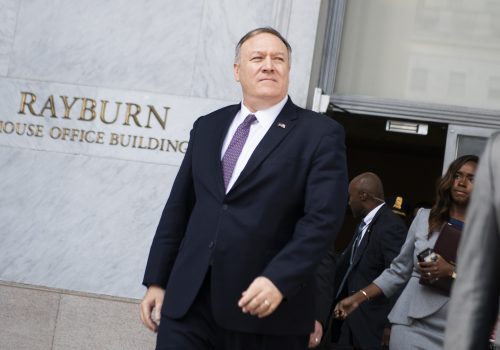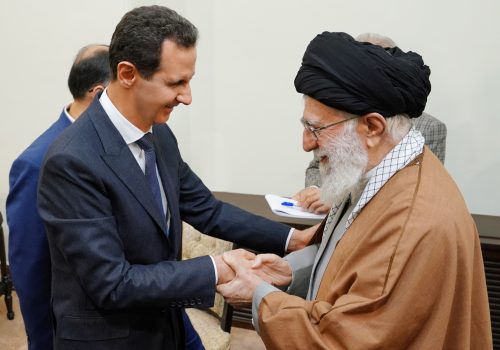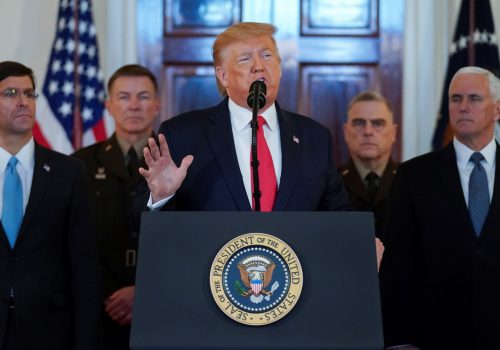Trump or Biden? Iran weighs the pros and cons of closely watched vote
US intelligence officials have concluded that Iran prefers a Joe Biden win come November. And why wouldn’t it? Biden has vowed to return to the Iran deal, the nuclear agreement that was forged when he served as vice president to Barack Obama.
Unlike Donald Trump, Biden is also familiar with the Middle East. It’s not just a casual “inshallah” dropped at the September 29 debate. He has traveled extensively throughout the region. I once met Biden—then a senator—in northern Iraq, where he and fellow ex-Senator Chuck Hagel (R-NE) were visiting ahead of the 2003 war to overthrow Saddam Hussein. “What are you doing here, son?” he asked me, as if I, a journalist covering the Middle East, was the interloper.
Trump has accused Iran as well as China of trying to tilt the scales in Biden’s favor. “[The Chinese] are dreaming about [Biden] and so is Iran—dreaming about Joe—and so are numerous other countries,” Trump said during an August 15 press briefing at the White House. “They dream about it because if that happens, they’ll own the United States.”
In August, the US Director of National Intelligence concluded that “Iran seeks to undermine US democratic institutions, President Trump, and to divide the country in advance of the 2020 elections.” During the recent debate, Twitter said that it removed 130 accounts traced back to Iran which were generating disingenuous content apparently meant to shape American discourse.
How Iran views the election outcome will play an important role in determining its security posture in the coming months: whether it decides to escalate tensions with Washington or offer an olive branch to either an incoming Biden administration or a Trump White House with a renewed mandate.
Iranian authorities, including Foreign Minister Mohammad Javad Zarif, have publicly insisted for months that it will make no difference who wins in November. “US hostility to this nation is deeply-rooted and there will be no shift in US basic policy—to harm the Iranian nation—no matter whether Trump or Biden are elected US president,” Iranian parliamentary speaker Mohammad Baqer Qalibaf said in parliament on September 20.
But other voices have been less coy. The reformist newspaper Sharq recently argued that a Biden victory would reduce economic pressure on Iran. “Democrats are softer compared to Republicans,” it said.
Iran appears to be closely watching the campaign. According to a survey by the Iranian Students Polling Agency, three-quarters of Iranians are following US election news. Another poll showed that 96 percent of Iranians are following the US presidential contest to some degree. Iranian state television covered the recent debate between the two candidates. President Hassan Rouhani and numerous Iranian pundits commented on it, seemingly gloating over the acrimony between the two candidates. “America has been disgraced,” said the daily Kayhan, a mouthpiece of the hardline establishment.
Iranian media was also quick to report Trump’s COVID-19 infection, with apparent satisfaction. One hardline Iranian news platform published an image of a coronavirus topped with Trump’s hair.
But experts inside and outside the country say that, while much of Iran prefers a Biden win, there is some nuance. In terms of policy, “there is not a big difference between the two when it comes to how Iran sees it,” says Ali Fathollah-Nejad, an expert on Iranian domestic politics at the University of Tubingen. Though a Trump reelection may mean the continuation of the maximum pressure campaign that has greatly damaged the Iranian economy, his perceived lack of principles and transactional mindset may make a favorable deal more likely. Iran has also benefited from the way in which Trump has alienated much of the rest of the world—particularly the US’s traditional European allies—through imposition of secondary sanctions.
While Biden’s calls to return to the Joint Comprehensive Plan of Action (JCPOA) may be welcome in Tehran, he is likely to face some opposition to the automatic re-lifting of sanctions on Iran—without further Iranian concessions—from some in the Democratic Party establishment. Meanwhile, Trump would likely run roughshod over anything his party demanded of him.
In any case, maximum pressure is devastating Iran, affecting the calculations of both Iranian elites and ordinary people. “The majority of the Iranian people and Iranian elite prefer that Biden come to power but there are differences,” says Ali Omidi, a professor of political science at the University of Isfahan.
A hawkish camp within the conservatives much prefers that Trump is reelected, hoping that an increase in tensions between Iran and the US would further empower them. But Omidi describes them as a fringe minority. “The majority of conservatives are very well aware that if Trump comes to power it is an existential threat to the Iranian system,” he said. “Mainly, Conservatives prefer Biden come to power so that tensions de-escalate.”
Who becomes president may ultimately play a marginal role in how Iran acts in the Middle East and the Persian Gulf. It has already calibrated its disruptions to avoid becoming a factor in the vote while keeping US ground and sea forces on their toes.
“Whoever wins, Iran will stick to its strategy, which may be aimed at increasing its leverage for potential talks with the US,” says Fathollah-Nejad. “Iranians actions and provocations in the region might not be connected to who is the president in the White House. There might be nuances that Iran has to be aware of when it comes to the president.”
Even before Trump won in 2016 and began steps to pull the US out of the JCPOA in 2018, Tehran was grumbling that Washington wasn’t holding up its end of the bargain and was continuing to block trade with the Islamic Republic. No matter who wins on November 3, there may be more continuity than change in US-Iran relations.
Borzou Daragahi is an international correspondent for The Independent. He has covered the Middle East and North Africa since 2002. He is also a Nonresident Fellow with the Atlantic Council’s Middle East Security Initiative. Follow him on Twitter: @borzou.
Subscribe for more from IranSource
Sign up for the IranSource newsletter, which provides a holistic look at Iran’s internal dynamics, global and regional policies, and posture through unique analysis of current events and long-term, strategic issues related to Iran.
Image: An Iranian holds a placard of the US President Donald Trump, during the commemoration of the 41st anniversary of the Islamic revolution in Tehran, Iran February 11, 2020. The placard reads "Sanction" . Nazanin Tabatabaee/WANA (West Asia News Agency) via REUTERS


